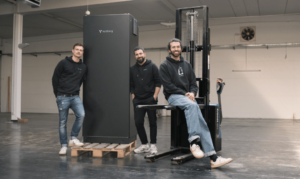
Generative AI startup Aindo, which has developed and patented synthetic data generation technology, announced a €6 million Series A round led by United Ventures, with participation from existing investor Vertis SGR through the fund Vertis Venture 3 Technology Transfer. This new funding will allow Aindo to grow the team by 10 more employees, and continue developing solutions that facilitate the use of artificial intelligence in strategic sectors such as healthcare, finance, and public administration.
Synthetic data is data that is created artificially as opposed to generated by real-world events. It’s manufactured algorithmically and is used as a substitute for testing purposes and to train machine learning (ML) models.
Founded in 2018, Aindo’s team aims not only to consolidate its position as a leader in synthetic data but also to revolutionize the concept of data mobility, understood as the secure exchange of information, with particular attention to privacy protection.
“We’re thrilled to announce this new funding round, which will fuel our growth at a crucial phase of the company’s development,” said Daniele Panfilo, co-founder and CEO of Aindo. “When we launched Aindo, Generative AI was barely known outside academic environments. In record time, it’s grown into the next billion-dollar category in tech, thanks to its mind-blowing capabilities that have captivated the world’s imagination. Our goal is to make data-driven innovation increasingly secure and ethically responsible for entire industries. Most organizations possess valuable structured information stored within their databases that cannot be used due to privacy protection. Creating synthetic data with generative AI solves that: the data Aindo regenerates behaves similarly to real data while fully protecting individuals’ privacy.”
United Ventures, a venture capital company focused on investments in high-tech companies, leads the investment round, a testimony to the growing role of synthetic data in promoting secure information exchange. Vertis, which invests in innovative Made in Italy projects, is betting on the strategic dimension of the technology.
Giulia Giovannini, partner at United Ventures, commented, ” The AI revolution still faces many obstacles, including data inaccessibility, long processing times, privacy concerns, and ethical issues related to data collection. Synthetic data is an answer to these problems, offering companies a tool of great importance to fully exploit the potential of artificial intelligence while ensuring the necessary privacy in data management. We believe that Daniele and his team have the right ambition to scale the platform internationally in the field of synthetic data, and we are excited to contribute to this round, as our very first investment from UV3, United Ventures recently launched fund.”
Roberto Della Marina, operating partner of Vertis SGR and managing partner of Venture Factory, added: “Synthetic data tech is undeniably one of the most promising emerging trends in AI. It’s what we call a horizontal innovation. In the coming years, the demand for synthetic data will be ubiquitous for all sectors relying heavily on data, particularly in healthcare, finance, and insurance. Aindo’s technology has the potential to impact millions of people’s lives.”
According to Gartner, synthetic data is among the emerging trends in AI. By 2024, 60% of the data used in AI projects will be synthetically generated compared to only 1% in 2021. A study by Grand View Research forecasts that the global synthetic data market will be valued at €1.79 billion by 2030.
The technology is in high demand from sectors ranging from healthcare and finance, to banking, and insurance. Notably, in the healthcare sector, Aindo’s synthetic data generation technology is already widely applied, from improving predictive analysis of pharmacological therapies in rare diseases to optimizing patient care in a hospital setting, to monitoring remote healthcare by anticipating potential risk situations.
- SEO Powered Content & PR Distribution. Get Amplified Today.
- PlatoData.Network Vertical Generative Ai. Empower Yourself. Access Here.
- PlatoAiStream. Web3 Intelligence. Knowledge Amplified. Access Here.
- PlatoESG. Carbon, CleanTech, Energy, Environment, Solar, Waste Management. Access Here.
- PlatoHealth. Biotech and Clinical Trials Intelligence. Access Here.
- Source: https://www.eu-startups.com/2023/10/trieste-based-aindo-bags-e6-million-series-a-to-use-synthetic-data-for-training-machine-learning-models/
- :has
- :is
- :not
- 10
- 2018
- 2021
- 2024
- 2030
- a
- academic
- added
- administration
- AI
- aims
- algorithmically
- All
- allow
- already
- also
- ambition
- among
- an
- analysis
- and
- Announce
- announced
- answer
- anticipating
- applied
- ARE
- artificial
- artificial intelligence
- AS
- At
- attention
- bags
- Banking
- BE
- believe
- Betting
- Billion
- but
- by
- call
- cannot
- capabilities
- capital
- care
- Category
- ceo
- Co-founder
- collection
- coming
- commented
- Companies
- company
- Company’s
- compared
- concept
- Concerns
- consolidate
- continue
- contribute
- created
- Creating
- crucial
- data
- data management
- data-driven
- databases
- Demand
- developed
- developing
- Development
- Dimension
- diseases
- due
- emerging
- employees
- ensuring
- Entire
- environments
- ethical
- events
- exchange
- excited
- existing
- Exploit
- faces
- facilitate
- factory
- field
- finance
- First
- focused
- For
- forecasts
- from
- Fuel
- fully
- fund
- funding
- Funding Round
- Gartner
- generated
- generation
- generative
- Generative AI
- Global
- goal
- grand
- great
- Grow
- Growing
- grown
- Growth
- Have
- healthcare
- healthcare sector
- heavily
- High
- his
- Horizontal
- Hospital
- HTTPS
- imagination
- Impact
- importance
- improving
- in
- Including
- increasingly
- industries
- information
- Innovation
- innovative
- insurance
- Intelligence
- internationally
- into
- investment
- investment round
- Investments
- investor
- Invests
- issues
- ITS
- jpg
- known
- launched
- leader
- Leads
- learning
- Led
- Lives
- Long
- machine
- machine learning
- make
- management
- managing
- managing partner
- manufactured
- many
- Market
- million
- millions
- mobility
- models
- monitoring
- more
- most
- necessary
- New
- New Funding
- next
- notably
- obstacles
- of
- offering
- on
- ONE
- only
- operating
- opposed
- optimizing
- organizations
- our
- outside
- participation
- particular
- particularly
- partner
- patented
- patient
- patient care
- people’s
- phase
- platform
- plato
- Plato Data Intelligence
- PlatoData
- position
- possess
- potential
- predictive
- Predictive Analysis
- privacy
- problems
- processing
- projects
- promising
- promoting
- protecting
- protection
- public
- purposes
- ranging
- RARE
- real
- real world
- recently
- record
- related
- relying
- remote
- research
- responsible
- Revolution
- revolutionize
- right
- Risk
- Role
- round
- Said
- Scale
- sector
- Sectors
- secure
- Series
- Series A
- series a round
- setting
- Similarly
- situations
- Solutions
- Solves
- Still
- stored
- Strategic
- structured
- Study
- such
- synthetic
- synthetic data
- synthetically
- team
- tech
- Technology
- testimony
- Testing
- thanks
- that
- The
- their
- therapies
- These
- this
- thrilled
- Through
- time
- times
- to
- tool
- Train
- Training
- transfer
- Trends
- ubiquitous
- undeniably
- understood
- United
- use
- used
- Valuable
- valued
- venture
- venture capital
- Ventures
- very
- View
- was
- we
- What
- which
- while
- widely
- will
- with
- within
- world’s
- years
- zephyrnet













